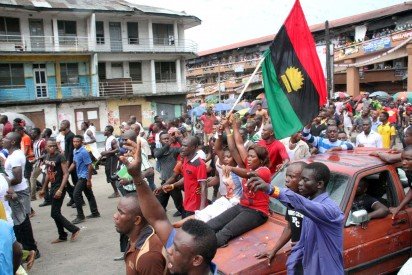Opinion
SBM Intelligence: Sifting Facts From Sentiments Over Biafra, Can It Work?

Nigeria became a unified country in 1914. Since then the country has faced some serious trials against its unity, the most serious during the civil war which took place 1967 – 1970. It was a war that resulted after one of 4 regions at the time (the Eastern Igbo-dominated region) sought to secede from the Nigeria after years of political unrest. This secession attempt was the culmination of the various contradictions within the Nigerian state. Before the Igbo secession that led to the war, the Yoruba of the then Western region as well as the Hausa-Fulani dominated Northern region had also contemplated and sometimes threatened secession. The civil war and the victory for the Nigerian forces put paid to secession attempts – for a while.
Forty six years after the end of the civil war, the agitations for separation have resumed, with each wave seeming to gain momentum than the last. If the Nigerian state continues the policy of either ignoring such agitations or meeting them with punitive force, the present South-East geopolitical zone (the South-East) and the rest of Nigeria could be heading for a messy divorce with serious political and economic consequences for both parties. Following the return of democracy in 1999, there was the formation of the Ralph Uwazurike led Movement For The Actualization of the Sovereign State of Biafra (MASSOB). Things however did not escalate significantly until 2005 when MASSOB reintroduced the Biafran Pound into circulation. The move was met with unexpected excitement in the South East and the Obasanjo government moved to stem the tide by arresting Uwazurike, keeping him incarcerated until the Yar’Adua government released him in 2007. Moves like the launch of the Biafran Passport in 2009 led to several arrests of Uwazurike and his group’s members, culminating in the Jonathan administration declaring the group an extremist group in the same bucket as Boko Haram in 2013. The arrest in Nigeria of the UK-based Radio Biafra “director” Nnamdi Kanu has brought to the fore the clamour for a separatist Biafran nation. The rise of IPOB and Nnamdi Kanu shows that except the issue is tackled at its root, newer, more sophisticated movements among ever younger generations demanding Biafra will keep rising.
This report does not make a case either for or against the Igbo Nation’s independence. The purpose of this report is to empirically examine Biafra, its history, its viability, the level of support it enjoys and objectively provide a case for or against Biafran secession. We have examined the available data and conducted interviews on the economics and politics of independence, and we have sought to present our conclusions in an easily understandable form. Our methodology for gauging support included first, the use of an online polling engine to capture the internet savvy (and mostly educated – over 70% with a minimum of BSc) Igbos located across the country, and second face-to-face (on the ground) interviews to survey Igbos resident in the South East and South South. We quickly observed that discussions on the issue of a Biafran state can be volatile. Online, it often devolved into ethnic shouting matches, and on the ground, it sometimes lead to dangerous encounters for our correspondents. For example, our correspondent was arrested by the police in Ebonyi for conducting the survey and the survey forms seized.
Both polls, online and offline, asked questions around whether respondents wanted a referendum on Biafran independence and then what their responses would be if the referendum was indeed carried out. A surprisingly large percentage of online respondents were in favour of a referendum to determine if the South East and other regions should pursue independence (79.1%). Few of the respondents were in favour of maintaining the status quo (24.6%) – i.e. Nigeria’s present “unitary federal structure”. Few of the respondents were in favour of full independence too (23.5%). Most online respondents preferred autonomy (26.2%) and limited autonomy (including resource control) (25.7%). Most offline respondents wanted full independence. On the issue of a referendum, most people, in both surveys, want to have at least a shot at a referendum. If this happens, and the Igbo people vote to leave Nigeria, the task will not be easy as the economy, politics, culture and society of the Igbo Nation is more-or-less fully integrated into the larger Nigerian nation.






